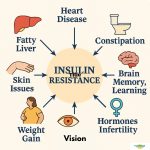Childhood is meant to be a time of safety and growth, but for many, it’s marked by trauma, neglect, or instability. These early wounds don’t just affect our minds. Mounting scientific evidence shows they shape our biology, raising our risk for chronic illness, pain, and even early death.

Let’s explore how Adverse Childhood Experiences (ACEs) rewire the brain, stress response, immune system, and gut, and most importantly, how we can begin to heal and reverse their impact.
🔍 What Are ACEs?
ACEs (Adverse Childhood Experiences) refer to potentially traumatic events or conditions that occur before the age of 18. The original CDC-Kaiser ACE Study (1998) identified:
- Emotional, physical, or sexual abuse
- Emotional or physical neglect
- Domestic violence
- Parental divorce or abandonment
- Living with someone who has a mental illness, substance abuse, or incarceration
Since then, the list has expanded to include:
- Bullying
- Racism
- Community violence
- Living in foster care
- Poverty or housing instability
🎯 What Is an ACE Score?
Each unique type of trauma counts as 1 point. For example, someone who experienced physical abuse, neglect, and parental divorce would have an ACE score of 3.
⚠️ Important Note: The ACE score is not a diagnosis. It does not reflect how often or how severely the trauma occurred, nor does it account for protective factors like a loving caregiver or community support. It’s a starting point, not a verdict.
🧬 How ACEs Rewire the Body & Brain
1. Stress Response System (HPA Axis Overdrive)
The Hypothalamic-Pituitary-Adrenal (HPA) axis controls your body’s response to stress. When trauma is chronic or unprocessed, this system becomes overactive, and your body stays stuck in “survival mode.”
- The hypothalamus signals the pituitary gland
- The pituitary signals the adrenal glands
- The adrenals release cortisol, your stress hormone
While cortisol helps in short-term emergencies, chronic elevation leads to:
- Immune suppression
- High blood sugar
- Poor digestion
- Sleep disruption
- Increased inflammation
2. Inflammatory and Immune Disruption
Childhood trauma leads to persistent low-grade inflammation. Studies show elevated levels of:
- IL-6 (Interleukin-6) → linked to fatigue, mood disorders, autoimmunity
- TNF-α (Tumor Necrosis Factor-alpha) → linked to joint pain, RA, and tissue damage
- CRP (C-reactive protein) → a marker for systemic inflammation and cardiovascular risk
The immune system becomes dysregulated, increasing the risk of:
- Autoimmune disease
- Allergies
- Chronic infections
- Slower healing
3. Gut-Brain Axis Breakdown
ACEs impair the vagus nerve, which connects the brain to the gut. This leads to:
- Reduced parasympathetic tone (rest-and-digest state)
- Imbalanced gut microbiome
- Increased intestinal permeability (leaky gut)
- Digestive disorders like IBS, bloating, constipation, and food sensitivities
4. Brain Development & Mental Health
Chronic trauma alters key brain regions:
- The amygdala becomes hypervigilant (fear, anxiety)
- The hippocampus shrinks (memory and learning problems)
- The prefrontal cortex underdevelops (decision-making, impulse control)
This increases the risk for:
- Depression, anxiety, and PTSD
- Self-harm or suicidal ideation
- Attention and learning difficulties
5. Epigenetic Changes: Trauma in Your DNA
ACEs affect how your genes express themselves without changing the DNA sequence. This process, called methylation, alters genes that regulate:
- Inflammation
- Stress resilience
- Brain function
Trauma leads to the accumulation of oxidative stress, a precursor to many diseases. When we are stressed or experiencing trauma, we have anxiety, which shortens the telomeres. These are DNA molecules (like the plastic tips at the ends of shoelaces) found at the end of each chromosome, and they limit the number of times our cells can divide!
Childhood trauma or chronic stress can shorten these telomeres, leading to cells not dividing normally. The telomere difference could translate into a 7–15 year difference in lifespan.
These changes can be passed down to future generations. Trauma literally becomes a biological legacy.
👩 Why Are Women More Vulnerable?
- Women are statistically more likely to experience specific ACEs, especially sexual and emotional abuse.
- Hormonal systems are highly sensitive to trauma, contributing to conditions like:
- Fibroids
- Endometriosis
- Breast cancer
- Cultural shame and internalized trauma often lead to body disconnection, avoidance of care (e.g., gynecological exams), and delayed diagnoses.
- Emotional pain is more likely to be suppressed due to gender roles, which keep the inflammation cycle alive.
🩺 ACE-Linked Chronic Conditions
Here are just a few conditions connected to early trauma:
- Mental health: Depression, anxiety, PTSD, suicidal thoughts
- Autoimmune: RA, lupus, Hashimoto’s
- Digestive: IBS, IBD, chronic constipation
- Hormonal: Endometriosis, fibroids, PCOS
- Neurological: Chronic fatigue, fibromyalgia, migraines
- Metabolic: Obesity, Type 2 diabetes
- Cardiovascular: Heart disease, stroke, hypertension
- Cancer: Breast, cervical, colorectal, lung
- Neurodegeneration: Early cognitive decline, Alzheimer’s

🛠 How to Heal: It’s Never Too Late
1. Trauma-Informed Therapy
- EMDR (Eye Movement Desensitization and Reprocessing)
- Somatic Experiencing, breathwork, tapping
- Inner child work, grief processing
- Rebuilding a safe emotional connection
2. Nervous System Regulation
- Vagus nerve toning: humming, gargling, cold exposure
- Gentle movement: yoga, shaking, bouncing
- Prioritize deep, restful sleep
3. Anti-Inflammatory Lifestyle
- Nutrient-dense foods: leafy greens, berries, omega-3s, polyphenols
- Gut healing: probiotics, fermented foods, glutamine, zinc
- Deep hydration + electrolyte minerals
- Reduce exposure to toxins (endocrine disruptors, mold, processed foods)
4. Protective Social Factors
- One stable, supportive relationship
- Safe, community-based, or spiritual support
- Opportunities for purpose and autonomy
🧡 Final Message
Your biology is not your biography.
Trauma doesn't mean you're doomed. It means your body adapted to survive. Now, it needs new support. We live with a lot of hurt and anger! How do you overcome the hurt?
We all want to be seen and heard. Anger is a survival mechanism.
You didn’t choose the trauma, but you can choose healing, one breath, one bite, one boundary at a time.
📚 Resources
- Philadelphia ACE Study (2013) — Expanded ACEs to include racism, poverty, and community violence.
- Yehuda et al. (Mount Sinai) — DNA changes from trauma
- Harvard Center on the Developing Child — “Toxic stress” model
- WHO ACE-IQ — Global impact of early trauma
- NCTSN and Dube et al. — Links between ACEs and lifelong health outcomes


















Comments
No Comments